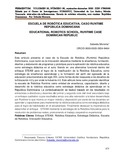Mostrar el registro sencillo del ítem
Escuela de robótica educativa, caso runtime República Dominicana
| dc.rights.license | http://creativecommons.org/licenses/by-nc-sa/3.0/ve/ | es_VE |
| dc.contributor.author | Moronta, Sobeida | |
| dc.date.accessioned | 2023-07-27T13:45:15Z | |
| dc.date.available | 2023-07-27T13:45:15Z | |
| dc.date.issued | 2023-07-27 | |
| dc.identifier.issn | 0798-3069 | |
| dc.identifier.uri | http://www.saber.ula.ve/handle/123456789/49738 | |
| dc.description.abstract | Este artículo presenta el caso de la Escuela de Robótica (Runtime) República Dominicana, cuya razón es la innovación educativa mediante la enseñanza, formación, diseños y elaboración de programas y prototipos para la aplicación de robótica educativa como estrategia didáctica en el aula. Siendo en una alternativa funcional dentro del enfoque STEAM para el logro de la masificación de la Robótica Educativa, como estrategia de enseñanza aprendizaje y la formación del perfil del egresado de la educación preuniversitaria del siglo XXI, como forma de dar respuesta a los desafíos de la Educación 4.0 y por ende la Industria 4.0. Este artículo tiene como propósito identificar la escuela de Robótica Runtime como entidad de enseñanza, capacitación, diseño y desarrollo de la robótica educativa como estrategia didáctica de aprendizaje en la Republica Dominicana. La contextualización se realizó basado en los resultados de entrevistas a directivos y docentes del primer y segundo ciclo del nivel secundario bajo un enfoque cualitativo cuyos resultados arrojo una alta valoración a la labor desarrollada por Runtime lo que motiva un mayor interés y disposición por parte de los docentes en aprender y capacitarse para implementar la robótica educativa como estrategia didáctica para el logro de habilidades en el estudiantado. Finalmente destacan la importancia de desarrollar el enfoque STEAM mediante la estrategia de la Robótica Educativa para la resolución de problemas reales, promoviendo el trabajo cooperativo experiencial. | es_VE |
| dc.language.iso | es | es_VE |
| dc.publisher | SaberULA | es_VE |
| dc.rights | info:eu-repo/semantics/openAccess | es_VE |
| dc.subject | Enfoque STEAM | es_VE |
| dc.subject | Robótica educativa | es_VE |
| dc.subject | Estrategia didáctica | es_VE |
| dc.subject | Escuela de robótica | es_VE |
| dc.subject | Innovación educativa | es_VE |
| dc.title | Escuela de robótica educativa, caso runtime República Dominicana | es_VE |
| dc.title.alternative | Educational robotics school, runtime case Dominican Republic | es_VE |
| dc.type | info:eu-repo/semantics/article | es_VE |
| dc.description.abstract1 | This article presents the case of the School of Robotics (Runtime) Dominican Republic, whose reason is educational innovation through teaching, training, design and development of programs and prototypes for the application of educational robotics as a didactic strategy in the classroom. Being a functional alternative within the STEAM approach for the achievement of the massification of Educational Robotics, as a teaching-learning strategy and the formation of the profile of the graduate of pre-university education of the 21st century, as a way of responding to the challenges of the Education 4.0 and therefore Industry 4.0.The purpose of this article is to identify the Runtime Robotics School as an entity for teaching, training, design and development of educational robotics as a didactic learning strategy in the Dominican Republic.The contextualization was carried out based on the results of interviews with managers and teachers of the first and second cycle of the secondary level under a qualitative approach whose results yielded a high assessment of the work carried out by Runtime, which motivates greater interest and willingness on the part of the students. teachers in learning and training to implement educational robotics as a didactic strategy for the achievement of skills in the student body.Finally, they highlight the importance of developing the STEAM approach through the Educational Robotics strategy for solving real problems, promoting experiential cooperative work. | es_VE |
| dc.description.colacion | 875-883 | es_VE |
| dc.description.email | Sobeida_moronta@ucne.edu.do | es_VE |
| dc.description.frecuencia | Cuatrimestral | |
| dc.description.paginaweb | www.saber.ula.ve/fermentum | |
| dc.identifier.depositolegal | pp1991102ME302 | |
| dc.publisher.pais | Venezuela | es_VE |
| dc.subject.institucion | Universidad de Los Andes | es_VE |
| dc.subject.keywords | STEAM approach | es_VE |
| dc.subject.keywords | Educational robotics | es_VE |
| dc.subject.keywords | Didactic strategy | es_VE |
| dc.subject.keywords | School of robotics | es_VE |
| dc.subject.keywords | Educational innovation | es_VE |
| dc.subject.seccion | Revista Fermentum: Artículos | es_VE |
| dc.subject.tipo | Artículos | es_VE |
| dc.type.media | Texto | es_VE |
| dc.contributor.orcid | https://orcid.org/0000-0003-3934-9464 |
Ficheros en el ítem
Este ítem aparece en la(s) siguiente(s) colección(ones)
-
Fermentum - Año 033 - Nº 98
septiembre-diciembre 2023


